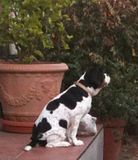erimou
New member
Hi there. I'm just curious if anyone else has this problem where your Cav's eyes are sensitive to light. For instance, if Boz sees the reflection of the sun hitting an object and it bounces on the wall, he will just go crazy about it. He becomes all fixated, and it's hard to break him from looking at it.
I also had to take the light bulb out of my vacuum, because somehow he became fixated on that.
Does anyone have this problem? If so, what's the best way to get him to stop? I usually stand in between him and the light source so he doesn't see it for awhile and tell him 'that's enough.' It seems to work for the most part....
Thanks!
I also had to take the light bulb out of my vacuum, because somehow he became fixated on that.
Does anyone have this problem? If so, what's the best way to get him to stop? I usually stand in between him and the light source so he doesn't see it for awhile and tell him 'that's enough.' It seems to work for the most part....
Thanks!

